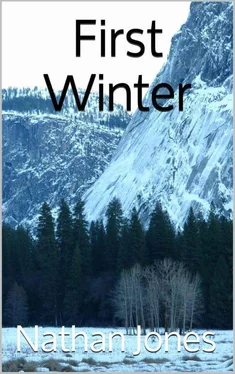“Lesson one,” Trev cut in dryly. “Don’t expect to get out much. We’ll be facing snowdrifts deep enough to bury our house, and bitter cold temperatures. Don’t be surprised if you’re walking in snow up to your waist after a fresh snowfall, and any crust that forms afterwards will almost be worse, since it probably won’t hold your weight. Even with the option of bundling up enough to handle the cold, by the time we’re halfway through this winter most of us will prefer relieving ourselves in buckets to trudging twenty feet to use an icy cold outhouse.”
“Fantastic,” Linda muttered. “Thanks for sharing.”
Lewis gave the young woman a steady look. “If you have trouble even hearing about it, consider when you’ll have to live it. We’ll do the best we can to make things comfortable and allow for privacy, which is why we’ve built lean-tos against the back doors of both cabins, fitted with benches with holes to put the bucket beneath. We’ll use our proven trick of heating stones against the stove to carry out there when we need to use the space. With them the temperature should be tolerable, and while you’ll still have to bundle up and head outside to empty the bucket and clean it out, it’s better than doing your business in the cold.”
Linda pouted a bit at the mild rebuke, but subsided.
“And that’s just the first of the hard realities we have to face about what’s coming,” Trev said, motioning for Lewis to continue.
In his usual thorough, orderly fashion his cousin laid out ideas to make handling living in the cold more workable. Everything from priorities when it came to cold weather gear, what signs to look out for when it came to frostbite and other cold related medical issues, to storing, protecting, rationing, and cooking their food.
One of the biggest considerations outside of food was firewood. They’d gathered up a huge store, both from cut and split logs and from all the extra bark, wood chips, and other detritus left over from construction, and they continued to add to their woodpiles. Since they’d now been using the wood burning stoves for so long, they had a good idea of how much they needed to keep the fire burning consistently for long periods of time. Given that, they were confident they had enough to keep them going through even a winter that lasted more than half a year.
There was also the option that if the weather wasn’t too bitter they could head out and chop down more trees, although unseasoned wood didn’t burn very well so they might be better off gathering deadfall. That would be tough since most of the deadfall within miles of town had already been dragged in, but with sleds they could venture farther afield and might even have an easier time moving it.
But whatever the situation of their firewood, as a rule Lucas wanted them all to strike a balance of using just enough fuel to keep their cabins tolerable during the day, and if possible damping the stoves and relying on blankets and shared body heat at night. Even if they had enough wood to last them more comfortably, that fuel represented labor and the less they used the more time and energy they’d be able to put to other things long term.
“So don’t expect to be hanging out in shirtsleeves, even indoors,” his uncle finished wryly. “Either bundle up, stay under your blankets, or get used to hanging out a foot from the stove doing whatever work you can find to fill the hours.”
For Trev most of that work was going to be making bullets with Lewis. Now that his cousin had what he needed and they were all set to go, they’d be able to fill the winter months with a mindless, repetitive task where they were motivated to produce the best quality possible because lives could literally be on the line.
Trev could barely conceive of what those reloaded cartridges could mean for them. Lewis now had enough casings, powder, primers, and lead and jacketing material for thousands of rounds. Aside from their families never having to worry about running out of ammunition again, the profit they could make from selling the surplus should be enough to feed them through the next winter, if not longer.
And his cousin intended that to be only the beginning. While closing the deal with Ned he’d mentioned to the trader that he might keep an eye out for more reloading materials. If he managed to find any he’d always have a buyer in Aspen Hill willing to pay a fair price.
Lewis had even spoken more than once about his dream to ultimately open a large-scale bullet factory and become a major manufacturer. Trev wasn’t ready to think quite that long term yet, considering they were still barely past figuring out how to use the reloading equipment and had almost no practice at it.
Still, it was a good dream. Going from scrambling to survive in a post-Retaliation world to securing a prosperous future, not to mention greatly benefitting the town and the remnants of the US at large with what they produced. Most people were still at the point of scavenging what they needed, so anyone willing to go a step farther and actually make useful products would help get them all that much closer to restoring the society they’d known.
Trev thought of how many people he’d run into since the Gulf burned who’d become criminals and parasites and further added to the destruction. Almost everyone else was focused solely on survival and not on any serious rebuilding. People like his cousin who had the knowledge, ingenuity, and drive to push the advancement of society by leaps and bounds, assuming he was successful, were few and far between.
He felt lucky to be a part of it.
Although even though the reloading work would probably fill many of his waking hours, it didn’t have much to do with the business of staying alive through the winter.
Once he and Lewis had exhausted their knowledge and advice about winter in the mountains, everyone went around the room providing their own thoughts and concerns. Things like running ropes between shelter group houses so people would be able to find each other in a storm, digging tunnels to get from place to place once the snow got deep enough, and ways to vary the meals so people didn’t get sick of eating.
The conversation, solemn as it was, was also a good bonding opportunity for the family. After a few hours it became more relaxed, with more laughing and joking, at which point Lucas announced that they’d probably done as much good as they were going to here and called the meeting to a close. Most of the family stayed to chat after that, but Trev said goodnight to Deb and the others and joined Lewis and Jane in their room doing more reloading work.
Oddly enough the biggest concern with working long hours in winter was that the sunlight hours were going to be short, and often the light would be obscured by clouds, so solar lighting wouldn’t be an option for as long as they’d probably have use for it. Even the efficient LED Christmas lights drained the batteries when used for long enough, which meant using other electronics would soon be off the table, at least as much as they had been. They’d have to ration electricity, and try to make use of the windows and daylight as much as possible.
Since the three of them were still getting used to the intricacies of reloading the work was quiet as they all concentrated on their individual tasks. Trev was glad he had the manual dexterity to produce good work even before the experience of long practice made him adept at it, since they couldn’t afford to waste materials and every cartridge counted. Still, he made more than a few mistakes, and although Lewis and Jane were also making mistakes and they were all encouraging each other it was still frustrating.
They worked late, after everybody had gone to bed. And since they were working quietly they all pricked their ears when they heard whispering from the main room. Trev recognized the voices as Aunt Eva and Uncle Lucas.
Читать дальше












